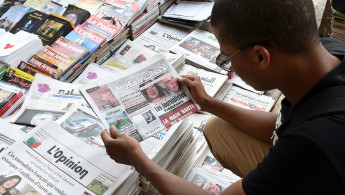Moroccan journalists risk imprisonment for running smartphone app training
Moroccan journalists risk imprisonment for running smartphone app training
Moroccan journalists are to go on trial for participating in a citizen journalist training course in what Amnesty International describes as a 'violation for freedom of expression.'
2 min read
Morocco has come under fire for restricting freedom of expression [Getty]
In Morocco seven journalists and activists are on trial for participating in a training course using smartphones, in what Amnesty International has said sets a "dangerous precedent" for restricting freedom of expression.
The seven defendants were running a citizen journalism training programme.
"The trial of these journalists is a worrying test case for press freedom in Morocco. The accusations that journalists and citizens reporting freely in their country are compromising state security, and the risk that they may be imprisoned, are deeply alarming," said Magdalena Mughrabi, Deputy Director of the Middle East and North Africa Programme at Amnesty International.
Five of the defendants, including historian Maati Monjib, are accused of "threatening the internal security of the state" through "propaganda" that may threaten "the loyalty that citizens owe to the State and institutions of the Moroccan people".
They could be imprisoned for up to five years if found guilty.
The remaining two defendants, journalists Maria Moukrim and Rachid Tarik are being tried for "receiving foreign funding without notifying the General Secretariat of the government."
Amnesty International is calling on the authorities to drop the charges against the seven defendants.
In recent months the Moroccan government has trumpeted high-profile judicial reforms including an overhaul of the Penal Code.
While Amnesty International said that while new draft laws include some "positive proposals for human rights", certain Article 206 is still used to violate freedom of expression.
"Morocco’s authorities should drop these shocking charges against these seven journalists and activists immediately. They should repeal or amend Article 206, so that it can no longer be used to arbitrarily restrict freedom of expression," said Magdalena Mughrabi.
The seven defendants were running a citizen journalism training programme.
"The trial of these journalists is a worrying test case for press freedom in Morocco. The accusations that journalists and citizens reporting freely in their country are compromising state security, and the risk that they may be imprisoned, are deeply alarming," said Magdalena Mughrabi, Deputy Director of the Middle East and North Africa Programme at Amnesty International.
Five of the defendants, including historian Maati Monjib, are accused of "threatening the internal security of the state" through "propaganda" that may threaten "the loyalty that citizens owe to the State and institutions of the Moroccan people".
They could be imprisoned for up to five years if found guilty.
The remaining two defendants, journalists Maria Moukrim and Rachid Tarik are being tried for "receiving foreign funding without notifying the General Secretariat of the government."
 |
The trial of these journalists is a worrying test case for press freedom in Morocco. The accusations that journalists and citizens reporting freely in their country are compromising state security, and the risk that they may be imprisoned, are deeply alarming - Magdalena Mughrabi, Amnesty International |
 |
In recent months the Moroccan government has trumpeted high-profile judicial reforms including an overhaul of the Penal Code.
While Amnesty International said that while new draft laws include some "positive proposals for human rights", certain Article 206 is still used to violate freedom of expression.
"Morocco’s authorities should drop these shocking charges against these seven journalists and activists immediately. They should repeal or amend Article 206, so that it can no longer be used to arbitrarily restrict freedom of expression," said Magdalena Mughrabi.
StoryMaker is a secure storytelling app developed by Free Press Unlimited (FPU), which enables citizen journalists to publish content anonymously if they wish to.
FPU recently reported that its request to meet the Moroccan authorities to explain its work and the StoryMaker app was left unanswered.
FPU is calling on Moroccan authorities to drop charges against the seven defendants and not put freedom of expression on trial.
Several defendants are also former supporters or members of the 20 February Movement, Morocco’s peaceful pro-democracy and anti-corruption protest movement that emerged in 2011 in the context of popular uprisings in the region.


